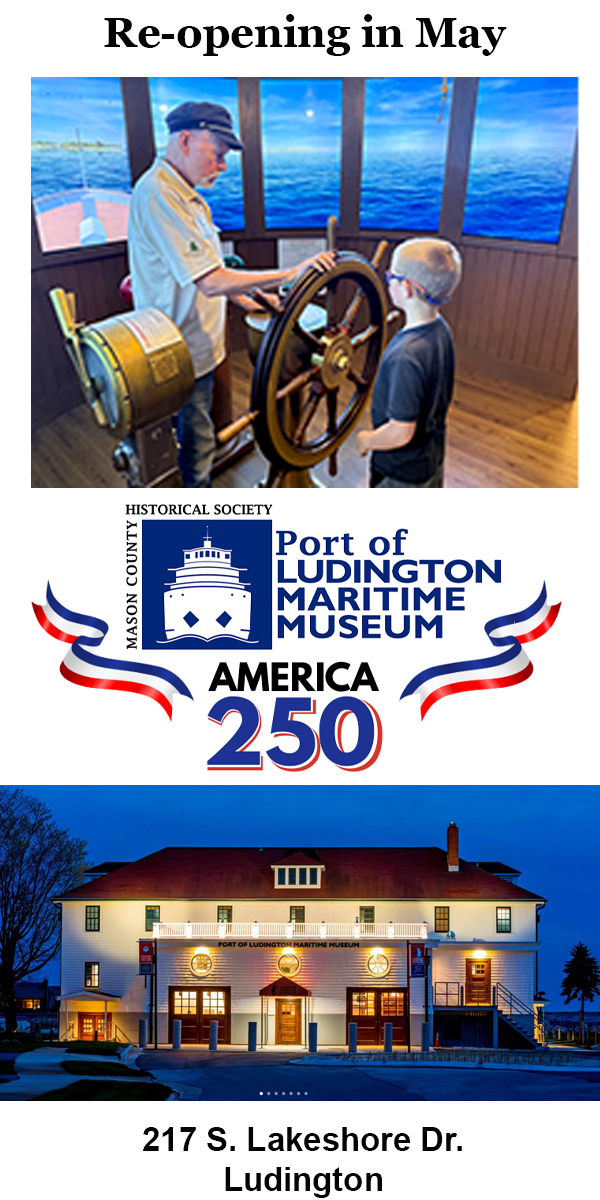 By Rob Alway, Editor-in-Chief
By Rob Alway, Editor-in-Chief
LUDINGTON — On Wednesday, the U.S. Coast Guard hosted a town hall meeting at the Ludington Municipal Building to discuss safety concerns in the Ludington channel and Pere Marquette Lake.
The meeting was held in response to an apparent increase in water vessels disregarding common practices and courtesies of yielding to larger vessels, such as the SS Badger and freighters.
In late summer and early fall of this year, the SS Badger and other large commercial vessels had multiple encounters with smaller crafts.
Leading the meeting was Chief Warrant Officer Nick Gera, commanding officer of Coast Guard Station Manistee, which patrols the Lake Michigan shoreline from Leland to Stony Lake. Accompanying him was Lt. Commander Jessica Anderson, chief of waterways management, stationed in Milwaukee, along with Lt. Joe Molnar of the Michigan Department of Natural Resources law enforcement, based in Cadillac, Ludington Police Department Chief Chris Jones and Mason County Sheriff Kim Cole.
Audience members included representatives of Lake Michigan Carferry, including General Manager Sara Spore, and captains Mike Martin and Ed Wiltse, along with representatives from both the Ludington Charter Boat Association and Michigan Charter Boat Association, and recreational boaters and fishermen.
Both Chief Gera and Chief Jones emphasized that the violators do not come from one specific group. Jones said he has seen kayakers, sailboaters and fishing vessels each get in the way of commercial vessels coming in and out of the harbor. They also stressed that the Badger has not been the only commercial vessel experiencing issues.
Lt. Cmdr. Anderson said Wednesday’s meeting served as the opening of seeking public input as the Coast Guard considers creating a regulated navigation area (RNA).
According to the USCG’s website, RNAs are water areas within a defined boundary for which regulations for vessels navigating within the area have been established. The district commander can issue RNAs to control vessel traffic in a place determined to have hazardous conditions. RNAs usually prescribe what type or size of vessels may enter an area or in what manner they must navigate.
RNAs differ from safety and security zones in two respects. First, only district commanders are authorized to establish RNAs; Coast Guard captains of the port may not. Second, safety and security zones are typically transitory in nature, responsive to a temporary safety or security concern on the water. They are meant to control access to an area; but they could also be used to control access based on compliance with specified temporary operating conditions within the safety or security zone necessary for the purpose of the zone’s creation.
RNAs are usually created where a more permanent solution to a safety or environmental concern is required. They principally regulate the operation of vessels permitted inside the area, but may establish control of access to an area if such controlled access is necessary.
Most of those who spoke agreed that the presence of law enforcement patrol vessels has helped deter issues. However, one audience member pointed out the lack of Coast Guard presence the last several years since the USCG has reduced personnel, concentrating them in the Manistee station and shuttering the Ludington station.
RNAs enacted by the Coast Guard can only be enforced by the Coast Guard, as it’s a federal regulation. However, Lt. Molnar of the DNR stated that the State of Michigan could adopt similar rules that would allow state and local enforcement.
Reduction in Coast Guard staffing has resulted in more strain on state and local patrols, especially on the Mason County Sheriff’s Office and Ludington Police Department.

Sheriff Kim Cole said patrolling the harbor while commercial vessels, such as the Badger, come and go, is a top priority for his department.
Following the meeting, Chief Gera told MCP that he is optimistic that staffing will be increasing again in the near future and that there are no plans to permanently close Station Ludington.
Capt. Wiltse of the Badger said his major concern are vessels that are directly in the path of the Badger.
“The slowest the Badger can travel safely is 8 knots per hour,” Wiltse said. “Anything below that and I do not have control over the vessel. The Badger is 6,500 tons and she doesn’t stop on a dime.”
Both captains Wiltse and Martin stated that vessels traveling on the edge of the channel do not pose issues for the Badger, except at the pierheads, where the channel is narrow. Wiltse said high winds mean he has less ability to keep the Badger traveling in a straight line.
Wiltse said the Badger has many blind spots. “If you don’t get out my way, I’ve lost sight of you. I don’t know where you are,”he said. “My options become very limited. It’s like driving a tractor trailer on ice. You just can’t stop or turn.”
Capt. Martin added that another concern are vessels that anchor in the Badger’s turning basin. An incident later in the Badger’s season this past year caused the carferry to travel into Pere Marquette Lake to avoid colliding with a small vessel.
Both captains said they appreciate the local police presence in the channel and notice a significant change in traffic patterns when the patrol boats are there.
Capt. Wiltse recommended creating an RNA that makes it illegal for vessels to be within a quarter mile in front of a commercial vessel. No one in the audience disagreed with the suggestion.
Chief Gera said the City of Ludington has the authority to pass a local ordinance that would allow similar regulations on waterways within the city limits. However, the sheriff’s office and DNR would not have authority to enforce that ordinance without contracting with the city.
The next step in the federal process will be opening it up for public comment for 90 days.
____________________________________
Please Support Local News
Receive daily MCP and OCP news briefings along with email news alerts for $10 a month. Your contribution will help us to continue to provide you with free local news.
The easiest way is to sign up for an automatic monthly payment on Paypal. Click this link.
Alternative methods:
- We can send you an invoice for a yearly payment of $120, which you can conveniently pay online or by check. If you are interested in this method, please email editor@mediagroup31.com and we can sign you up. You can also mail a yearly check for $120 to Media Group 31, PO Box 21, Scottville, MI 49454 (please include your email address).
We appreciate all our readers regardless of whether they choose to continue to access our service for free or with a monthly financial support.
If you would like to support MCP/OCP but do not wish to receive daily emails, please consider sending a contribution to any of the above methods or pay by Venmo (@masoncountypress).
_____
This story and original photography are copyrighted © 2024, all rights reserved by Media Group 31, LLC, PO Box 21, Scottville, MI 49454. No portion of this story or images may be reproduced in any way, including print or broadcast, without expressed written consent.
As the services of Media Group 31, LLC are news services, the information posted within the sites are archivable for public record and historical posterity. For this reason it is the policy and practice of this company to not delete postings. It is the editor’s discretion to update or edit a story when/if new information becomes available. This may be done by editing the posted story or posting a new “follow-up” story. Media Group 31, LLC or any of its agents have the right to make any changes to this policy. Refer to Use Policy for more information.
Please consider helping to fund local news. Mason County Press and Oceana County Press are available for free thanks to the generous support of our advertisers and individuals. Three ways to help us: Venmo: @MasonCountyPress; Paypal: MasonCountyPress@gmail.com; Mail a check to PO BOX 21, Scottville, MI 49454.


















































.png)






